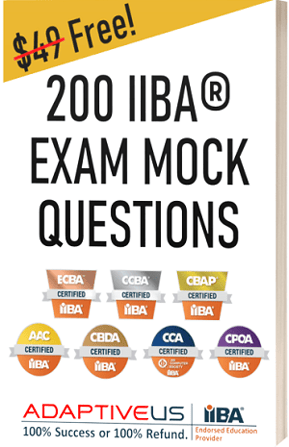CCBA vs CBAP Detailed Comparison | Free 200 Questions
Business analysis professional qualifications help business analysts in many ways. It proves their competence on the subject. It helps organizations to ensure their business analysts are rightly skilled in the business analysis process.
However, there is quite a lot of confusion in the business analyst’s minds as to which business analysis certification they should pursue. Among the organizations offering business analysis certifications, IIBA® is the most prominent one. It now has 30000+ members of which 12000 are now certified. CIO.com ranks the IIBA certifications among the top 10 certifications for Business Analysts.
IIBA certifications have been most popular and sought after certification among the business analysts globally. Both CCBA and CBAP certifications come from International Institute of Business Analysis (IIBA). IIBA has been doing amazing work on making the business analysis profession more recognized among the professional field and in the corporate segment. Checkout this video here.
Last year IIBA rolled out our new multi-level competency-based Certification program namely, ECBA (Level 1) for those entering the BA field, CCBA (Level 2) for professionals with 2-3 years of BA experience, CBAP (Level 3), for professionals with over 5 years of BA experience.
Certification of Competency in Business Analysis (CCBA)
CCBA is primarily targeted towards mid-level business analysis professionals who have served at least 3750 hours (roughly about 2.5 years) as business analysts in the industry performing BA approved tasks as per IIBA.
Certified Business Analysis Professional (CBAP)
CBAP is primarily targeted towards senior-level business analysis professionals who have served at least 7500 hours (roughly about 5 years) as business analysts in the industry performing BA approved tasks as per IIBA.
The table below gives the comparisons of both the certifications.
|
CCBA® |
CBAP® |
Certification Body |
|
|
IIBA® |
IIBA® |
|
Targeted at |
|
|
Mid-Level Business analysis professionals |
Senior Business analysis professionals |
|
Curricula |
|
|
BABoK 3.0 |
BABoK 3.0 |
Eligibility criteria – Work Experience |
|
|
Minimum 3750 hours of BA work experience aligned with the BABOK Guide in the last 7 years |
Minimum 7500 hours of BA work experience aligned with the BABOK Guide in the last 10 years |
|
Eligibility criteria –Knowledge Area expertise |
|
|
Minimum 900 hours in each of two of the six knowledge areas or minimum 500 hours in each of four of the six knowledge areas |
Minimum 900 hours in each of four of the six knowledge areas |
|
Eligibility criteria – Training / PD Hours |
|
|
Minimum 21 hours of Professional Development Training in the past four years |
Minimum 35 hours of Professional Development Training in the past four years |
|
Eligibility criteria – Reference Required |
|
|
Two references from a career manager, client or CBAP recipient |
Two references from a career manager, client or CBAP recipient |
Exam mode and pattern |
|
|
Online exam Multiple choice questions |
Online exam Multiple choice questions |
|
Exam Fees |
|
|
Application Fee - $145 Certification Fee – $250 (for members) $375 (for Non- members) |
Application Fee - $145 Certification Fee – $350 (for members) $475 (for Non- members) |
|
Re-Cert. Fees |
|
|
$250 for members $375 for non-members |
$250 for members $375 for non-members |
Exam/ Question Pattern |
|
|
3 hours long 130 multiple choice questions Questions are scenario-based
|
3.5 hours long 120 multiple choice questions Questions are longer cases (1 to 1.5 Pages of information) Multiple questions about the case |
|
Difficulty Level |
|
|
Medium Questions require the candidate to do a bit of the analysis to arrive at the answer |
High Questions require the candidate to do a good amount of analysis to arrive at the answer |
Questions as per knowledge area |
|
|
Requirements Analysis and Design Definition – 32% Elicitation and Collaboration – 20% Requirements Life Cycle Management – 18% Business Analysis Planning and Monitoring – 12% Strategy Analysis – 12% Solution Evaluation – 6% |
Requirements Analysis and Design Definition -30% Strategy Analysis -15% Requirements Life Cycle Management – 15% Solution Evaluation -14% Business Analysis Planning and Monitoring – 14% Elicitation and Collaboration – 12% |
|
Brand Value |
|
|
Medium |
High Organizations recognize this certificate in their competency framework |
Salary |
|
|
CCBA salary ranges between 80 to 90 K USD |
CBAP salary ranges between 80 to 120K
|
You may find the following pages to be useful in this context - CBAP details & CCBA details
We strongly recommends that you undergo rigorous CBAP training / CCBA Training from a seasoned BA coach. This will help increase the chances of passing in the very first attempt and in the shortest possible time. Training from an IIBA EEP (Endorsed Education Provider) will also give the much needed PDU’s (Professional Development Units) & guidance in form filling for the exam.
You May Also Like
These Related Stories

Everything BAs Must Know About IIBA PD Hours in 2025

Confused between CCBA and CBAP?



Comments (1)